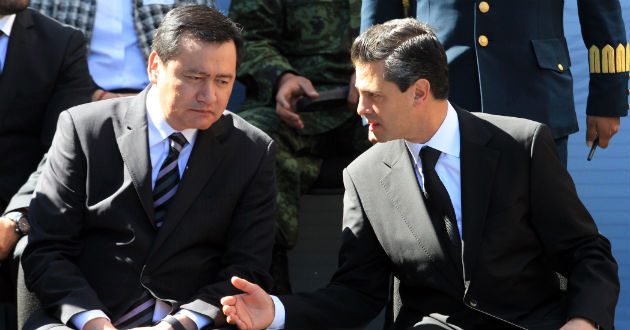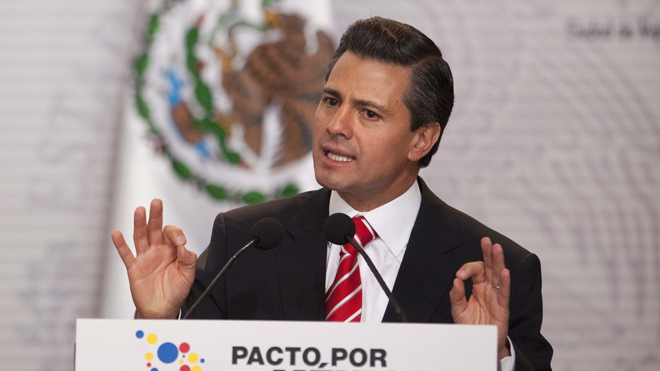The Mexican Media Blackout: Peña Nieto’s War on Bad Press
Six years of unremitting headlines on extreme violence and rampant crime has sullied Mexico’s reputation abroad. Felipe Calderón (2006-2012) and his confrontational “War on Drugs” grew increasingly unpopular over the years, resulting in the 2012 election of opposition party candidate Enrique Peña Nieto, who espoused a new security strategy and vision for Mexico. Since taking office last December, Peña Nieto has worked to shift the national dialogue toward other issues, like the economy, hoping the public would not notice that violent confrontations between the military and civilians remain a daily occurrence.
Peña Nieto particularly has worked to shift attention to the newly formed Pacto por México (Pact for Mexico), an agreement among the three dominant Mexican political parties that aims to pursue a wide range of modernizing reforms. Many of the proposed reforms seek to correct institutional weaknesses exposed under the previous administration. Two of the most important tasks are to achieve greater transparency and better protection for journalists. [1]
But, ironically, Peña Nieto’s efforts to improve Mexico’s image have directly undermined both of these stated objectives. The Peña Nieto Administration has worked to tightly regulate official information, subdue independent media coverage, and disorient international perception of drug-related violence in Mexico. In reality, the state of organized crime remains as perilous as ever, while press freedoms have continued to see a marked decline under Peña Nieto.
The All-Powerful Interior Ministry
For the last 12 years, coordination of internal security has been a shared responsibility between the Ministry of Public Security (Secretaría de la Seguridad Pública) and the Interior Ministry (Secretaría de Gobernación). Within a month of taking office, Peña Nieto eliminated the Ministry of Public Security and concentrated all powers related to security concerns under the Interior Ministry and its Secretary Miguel Osorio Chong, a trusted ally of the president. [2] Peña Nieto espoused this change as a way to better coordinate national security strategy. However, the extra powers conferred upon the Interior Ministry reveal Peña Nieto’s ulterior motives to strictly control official information—and thus media coverage—of violence related to organized crime and other security issues.
The new role and powers of the Interior Ministry are outlined in Article 27 of the Federal Public Administration Law (Ley Orgánica de la Administración Pública Federal), which took effect this January. [3] One interesting provision of the law confers great power on the Interior Ministry regarding public access to information:
- Section XL: Ensure that print publications, radio and television broadcasts, and films remain within the limits of respect for personal privacy, peace, public decency, and personal dignity, and do not attack the rights of others, provoke the perpetration of any crime, or disturb public order.
Thus, the Interior Ministry not only acts as the single clearinghouse for the divulgence of all official information to the media; it also reserves the right to interfere in any media coverage that it deems capable of “disturb[ing] public order.” [4] Peña Nieto has essentially deemed the protection of his reputation a matter of national security of the highest order.
The rivals of Peña Nieto’s Institutional Revolutionary Party (Partido Revolucionario Institucional; PRI) obviously see this public manipulation as problematic. Senators from the two main opposition parties (the PAN and PRD) proposed a bill called the Government Propaganda Act, which seeks to make government relations with the media more transparent. [5] It proposes the formation of a Citizens’ Council to create policies that ensure “objectivity, fairness, equity, institutional loyalty, and truthfulness.” It also calls for sanctions when government propaganda crosses legal boundaries. [6] While the legislation was primarily designed to make the election process fairer, the opposition parties are clearly working to target the PRI and its manipulation of the mass media.
The greatly empowered Interior Ministry has significantly reduced the amount of official information shared with the media, creating what some critics have described as a “fog of war” in Mexico. [7] While violent confrontations between public security forces and organized crime remain frequent, the government has drastically reduced the quantity and specificity of information now being made available to the public. As a result, media coverage of violence has fallen by 50 percent since December, and the public has no gauge for the level of security concerns in the country. [8]
Is Mexico Any Safer?
One of the principal projects of the Interior Ministry over the last several months has been to convince the international community that the epidemic of violence in Mexico is abating. The agency has worked to convey this idea by citing the official number of murders related to organized crime each month. According to Osorio Chong, the rate of organized crime-related murder fell by 14 percent in the first quarter of Peña Nieto’s presidency, as compared to the same quarter the year prior. [9]

The problem with this statistic is that it is highly subjective and open to manipulation. According to security analyst Alejandro Hope, government officials refuse to disclose the criteria for defining murders as “linked to organized crime,” allowing the federal government to classify murders however they see fit, and without oversight. [10] Furthermore, in August of last year, the Calderón administration stopped reporting the statistic, claiming that the practice was a “failed experiment” that “deeply undermined criminal procedure.” [11]
While the Peña Nieto administration claims that this statistic reflects improvement in the problem of violence, public opinion and other sources suggest otherwise. According to the London-based news agency Latin News, 72 percent of Mexicans believe that drug-related murders have either risen or stayed the same. [12] Additionally, two major Mexican newspapers, Reforma and La Jornada, have kept their own counts of organized crime-related murders and found that the number of victims actually increased since Peña Nieto took office. [13] Even the government’s own figures acknowledge that cases of kidnapping and extortion have increased significantly in the first four months of Peña Nieto’s presidency. [14] While the government has found one subjective measure to push its agenda, any informed citizen can see that its argument is largely unfounded.
The War on the Media
Over the last few months, several newspapers and local media agencies have either stopped reporting on drug violence or closed down operations altogether due to threats from government officials and drug traffickers alike. Artículo 19 (Article 19), a Mexican NGO, documented 151 attacks on the freedom of expression during the first half of 2013, marking an increase of over 46 percent from the same period last year. [15] These attacks included 26 threats, two assassinations, and one disappearance. Moreover, Article 19 found that the most common aggressors are, somewhat surprisingly, public officials, who were responsible for 36 acts of aggression from April to June alone. [16]
Ever since the launch of Calderón’s “War on Drugs” in 2006, Mexican journalists have suffered unprecedented levels of violence, harassment, and surveillance. In June 2012, Calderón signed the Law for the Protection of Human Rights Defenders and Journalists, which established a mechanism for prevention and protection. But since taking office in December, Peña Nieto and his administration have done little to ensure the effectiveness of the mechanism. In a recent letter to Osorio Chong, Maureen Meyer, a Senior Associate at the Washington Office on Latin America, a think tank in Washington D.C., wrote about “various obstacles that keep the Mechanism from carrying out its duties.” [17] She specifically expressed concern over noncompliance with protective measures.
The case of Anabel Hernández, an award-winning Mexican investigative journalist, exposes the gravity of this issue. In 2010, shortly after releasing Los Señores del Narco (The Drug Lords, a book exposing collusion between organized crime and government officials), Hernández was informed by the authorities of a high-level federal police officer’s plot for her murder. [18] The government provided her with 24-hour protective detail, which has kept her and her family safe, despite several threats — until now. In April, Hernández was informed that the government would no longer supply her with an armed guard. Instead, she will receive a mere “panic button” to call for protection when she is in danger. [19] Hernández has alleged that Peña Nieto “has no interest in either solving the murders of journalists or protecting them,” and that with this program he is simply “putting on a show for the outside world.” [20]
Conclusion
The day he took office last December, President Peña Nieto set out to improve Mexico’s reputation abroad at all costs. His fundamental alteration to the Interior Ministry has created a centralized federal security apparatus that, under the direction of the loyal Osorio Chong, can withhold and manipulate information at will. Moreover, the Administration’s failure to implement an effective mechanism of protection for journalists has resulted in an increasingly hostile environment for the free press. In fact, Freedom House now classifies Mexico as one of only five nations in the Western Hemisphere in which the press is “not free.” [21] These orchestrated efforts to suppress the truth have created a “fog of war” that has led some to believe that the situation of drug violence in Mexico is actually improving.
However, many remain acutely aware that the situation may in fact be worsening. The European Police Office (Europol) recently expressed concern about the expansion of Mexican drug cartel rings into Europe and Asia. Europol alleged that they have not only come to dominate the trafficking of cocaine worldwide, but are also expanding their activities into other circles, such as human and arms trafficking. [22]
Ultimately, Peña Nieto has achieved the rhetorical shift he desired all along. With a lack of official information and a mounting risk of reporting, the national media is increasingly turning its attention away from the epidemic of violence. But the Mexican people, many of whom are gravely affected by the security situation every day, as well as international organizations with access to the truth, are certainly not fooled.
Joseph Ringoen, Research Associate at the Council on Hemispheric Affairs.
Please accept this article as a free contribution from COHA, but if re-posting, please afford authorial and institutional attribution. Exclusive rights can be negotiated.
For additional news and analysis on Latin America, please go to: LatinNews.com and Rights Action
References
[1] “Los 5 Acuerdos,” Pacto por México, http://pactopormexico.org/acuerdos/.
[2] “Ley Orgánica de la Administración Pública Federal,” Cámara de Diputados del H. Congreso de la Unión. http://www.diputados.gob.mx/LeyesBiblio/pdf/153.pdf.
[3] Ibid.
[4] Ibid.
[5] “Oposición cabildeará con Peña su reforma política,” Milenio, http://monterrey.milenio.com/cdb/doc/noticias2011/eb3fa972ba56a0318e477689569ab35d.
[6] Ibid.
[7] Alejandro Hope, “In Mexico, Obfuscating Crime Numbers,” The Dallas Morning News, 17 May 2013, http://www.dallasnews.com/opinion/sunday-commentary/20130517-alejandro-hope-in-mexico-obfuscating-crime-numbers.ece.
[8] Juan Diego Quesada, “Las palabras narcotráfico y crimen organizado e vuelven tabú,” El País, 8 April 2013, http://internacional.elpais.com/internacional/2013/04/08/mexico/1365455778_816049.html.
[9] Alejandro Hope, “Mexico’s Violent Crime Numbers Don’t Add Up,” InSight Crime, 24 April 2013, http://www.insightcrime.org/news-analysis/mexico-violent-crime-numbers-add-up.
[10]Alejandro Hope, “In Mexico, Obfuscating Crime Numbers.”
[11] Miriam Wells, “Mexico Govt Reports Drop in Drug-Related Murders.” InSight Crime, 11 April 2013, http://www.insightcrime.org/news-briefs/mexico-reports-sharp-drop-in-crime-related-murders.
[12] “LatinNews Daily Report – 30 July 2013,” Latin News, latinnews.com.
[13] Wells, “Mexico Govt Reports Drop.”
[14] “Security Remains Top Concern of Mexicans,” Justice in Mexico Project, 4 July 2013, http://justiceinmexico.org/2013/07/04/security-remains-top-concern-of-mexicans/.
[15] “Segundo Informe trimestal: reprimir la protesta,” Artículo 19, http://articulo19.org/segundo-informe-trimestral-reprimir-la-protesta/.
[16] Ibid.
[17] “Anniversary of Mexico’s Law for the Protection of Human Rights Defenders and Journalists,” Washington Office on Latin America, 25 June 2013, http://www.wola.org/news/anniversary_of_mexicos_law_for_the_protection_of_human_rights_defenders_and_journalists.
[18] Sara Yasin, “Will Mexico’s plans for reducing violence mean anything for journalists?” Index on Censorship, http://www.indexoncensorship.org/2013/06/mexico/.
[19] Ibid.
[20] Ibid.
[21] “Americas,” Freedom House, http://www.freedomhouse.org/regions/americas.
[22] “Mexican Government Reports Decrease in Violence Amidst International Concerns,” Justice in Mexico Project, 8 May 2013, http://justiceinmexico.org/2013/05/08/mexican-government-reports-decrease-in-violence-amidst-international-concerns/.


